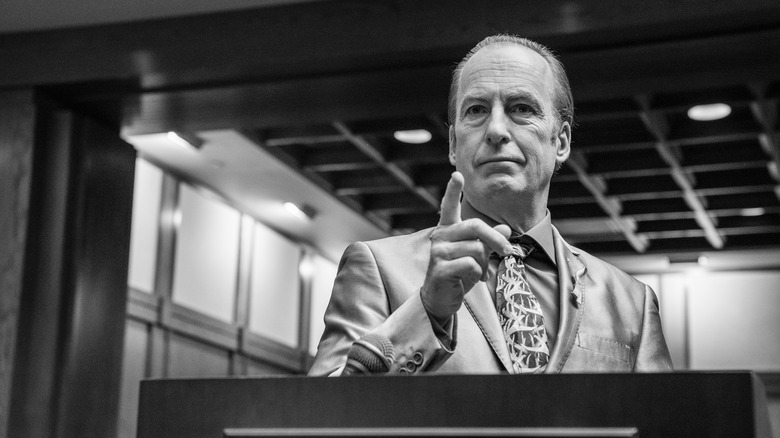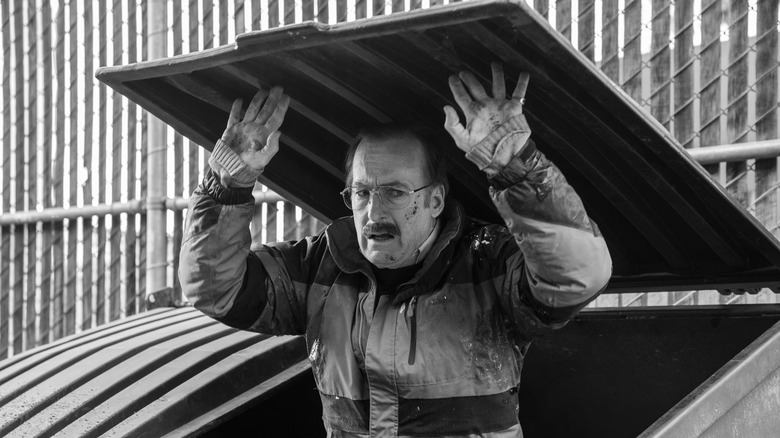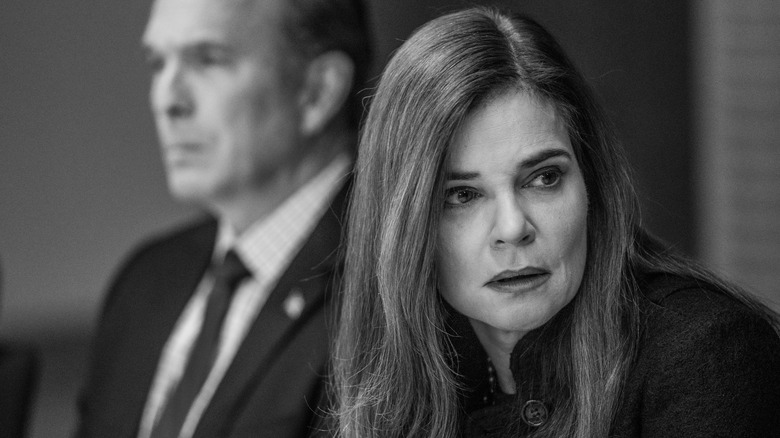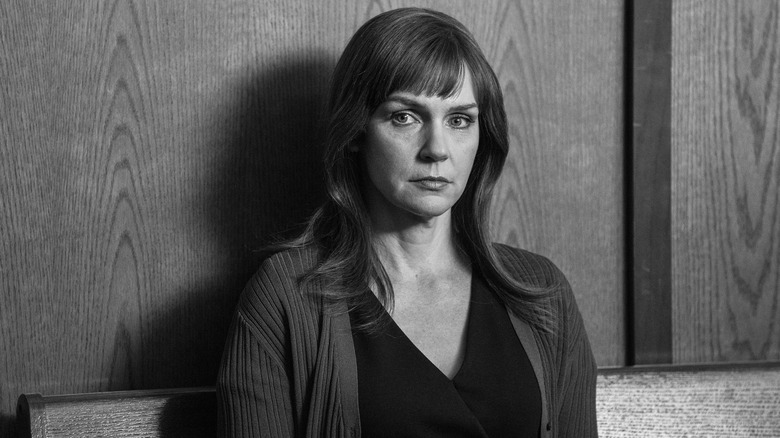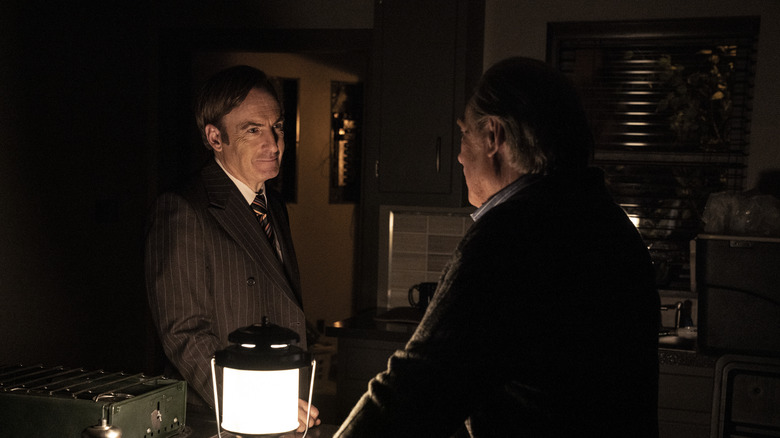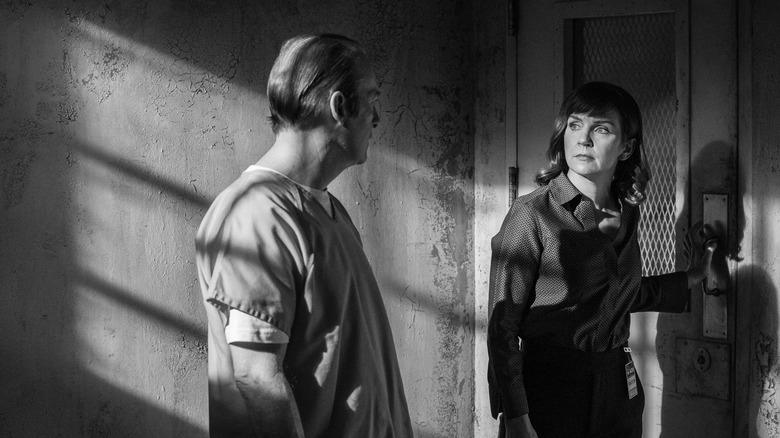It's Saul Gone In The Better Call Saul Series Finale
"What would you do if you had a time machine?" It's a question that comes up multiple times during "Saul Gone," the final episode of the masterpiece that is "Better Call Saul." We first hear it during a flashback to the season 5 episode "Bad Choice Road," where Jimmy and Mike are wandering through the desert hauling $7 million of Lalo's money. While pausing to rest at a watering hole, Jimmy asks Mike what he would do, and where he would go, with a time machine. Mike says he'd like to go back to the first time he took a bribe as a cop, presumably to stop himself from going down that road — and then into the future, to check in on people he cares about. Jimmy, in turn, talks about going back in time to invest in Berkshire Hathaway. Mike wryly observes that all Jimmy seems to care about here is money. In other words — is that all there is to Jimmy? Money?
The time machine question comes up again in another flashback, this time to when Jimmy, now in full Saul Goodman mode, was hiding out in the basement of the vacuum repair shop with Walter White. Jimmy poses the same question to Walt, and Walt, being Walt, blows up at him — because he insists time travel isn't possible. But ultimately, Walt narrows it down: Saul isn't asking about time travel; he's talking about regret. If you had a time machine, would you go back and change something you regret? Once again, Saul's answer is strange — he talks about going back in time to avoid hurting his knee during a "slip-and-fall" scam. Saul talking about his youthful con artist games has Walt make a realization in the form of a loaded question: "So you were always like this?"
"This" being a con artist; a crook; a bad guy. But we know that's true. We know that somewhere within Saul Goodman resides Jimmy McGill, a flawed but seemingly decent guy who went further into the dark side. As "Better Call Saul" neared its end, a question seemed to arise: can Jimmy McGill ever be redeemed for what he's done? And does he even deserve that?
What were you thinking?
There was no chance for Jimmy McGill, aka Gene, aka Saul Goodman, to make a getaway at this point. He was recognized and reported last week, and this week, he's arrested and hauled off to jail. As you might guess, this has "Gene" in shambles — he spent so long in hiding (not to mention a ton of money to get here), and now it's all over. His cover is blown. And he has no one to blame but himself — his reckless actions lead to this.
In his cell, he paces and punches the wall and asks himself what he was thinking. It looks like all is lost — and then, like a lightbulb going off above his head, Gene spots graffiti about a lawyer and has a revelation. He places a phone call to his former adversary Bill Oakley (Peter Diseth), who is now working as a defense attorney. As Saul Goodman, he offers Bill the chance to be his co-counsel in his case. Bill is hesitant, but Saul points out that such a high-profile case will help make Bill's career. Bill agrees and flies out to represent Saul, but he's not confident. As he points out, the government has a ton of evidence against Saul. "Where do you see this ending?" he asks Saul. "With me on top, like always," Saul replies.
Life plus 190 years
I'll confess that here I thought I had an idea of where the finale was going — Saul being so confident about being on top made me assume he had one final grand scheme up his sleeve, and that maybe, just maybe, Kim was somehow in on it. But of course, that was a fantasy; fan-fiction; something that would make me feel good even if it betrayed the heart of the show. But Saul does have a scheme or two left.
The government prosecutors think they have him dead to rights, and threaten him with life imprisonment plus 190 years for his crimes. Then they off him a plea deal — 30 years. But Saul is nonplussed. He demands an audience — from none other than Marie Schrader (Betsy Brandt), who is there to witness the proceedings. She rightly spits venom at Saul for aiding and abetting the people who killed her husband, Hank. Saul seems chastened at first and then spins a tale. First, he tells the truth, that Walt and Jesse kidnapped him and took him to an open grave. But then he goes on to lie and state that the only reason he worked for Walter White was out of fear; he felt that Walt would kill him if he turned.
Marie isn't buying it and neither is the federal prosecutor. At this point, Saul drops the act and states that all he needs is one juror to believe his story, and he could go free. From there, a lengthy agreement is worked out (against Marie's wishes). In the end, Saul is offered 7 and a half years in prison. He also insists on going to the same cushy federal prison as Bernie Madoff. Finally, he thinks he has one more ace in the hole: he'll tell them the truth about Howard Hamlin's murder. But here, the government one-ups Saul, stating that they already have the story from Kim. So he can either take his 7 years or go to trial. Saul ultimately agrees to take the deal. And yet ... something is brewing. On the flight back to Albuquerque, Saul asks Bill about what might happen to Kim for her confession. Bill states that while the DA might not go after her, Howard's widow can hit her with a civil suit. At this point, Saul says he has even more info about the murder; info Kim doesn't have. Bill points out that such info could only hurt Kim, but Saul seems all-in on the idea.
I'm the one who ran away
Saul being so blatantly out to hurt Kim was both horrifying and a hint of where this was really going. While a part of me thought that the character was so far gone that he just might turn on Kim to save his butt, there was another part of me that knew that Jimmy McGill really was still inside of Saul Goodman, waiting to get out.
As for Kim, she leaves her painfully boring job early one day to go and volunteer at Central Florida Legal Aid, a rinky-dink operation in a strip mall. It's dirty and cramped, but for the first time in a long time, Kim seems alive again — she's doing what she loves. Sure, she might not still be a lawyer, but working here gives her purpose again. She was born for this. But her joy is short-lived when she learns Saul has been arrested, and that he might implicate her in something.
And so the day comes — mustache-free and wearing a shiny suit, Saul Goodman struts into a court in Albuquerque. Kim is there, sitting in the back, her feet bouncing nervously. As the proceedings begin, the judge is shocked that Saul is getting such a short sentence for his crimes. Here, Saul Goodman goes to work. As he says right before court is in session, it's showtime. Taking the podium, Saul starts telling the same sob story he told Marie and the government: that he was forced to work for Walter White. But then ... the truth comes out. He admits that he saw an opportunity to make a fortune, and he took it. "Walter White couldn't have done it without me," he insists. He goes a step further, claiming Kim is guilt-free in Howard's death, adding: "Kim had the guts to start over. But I'm the one who ran away." And finally, he confesses that he wronged Chuck, his long-dead brother. As Bill points out, that wasn't a crime, but Saul insists it is. And then he insists he's no longer Saul Goodman — he's Jimmy McGill.
Chaos erupts in the court and Jimmy and Saul gaze at each other from across the room. There was a moment here when I thought the show would end here, and I held my breath. But there was more to come.
86 years
It's shocking to think of how much has happened on "Better Call Saul." When the show began, Jimmy's brother Chuck was a major force, and antagonist. But Chuck is now dead, and it feels like he's been gone for a very, very long time. Which makes his reappearance here in another flashback all the more jarring. It's a moment where the two brothers attempt to get close to each other, but ultimately can't. Chuck is too prickly, Jimmy is too defensive. "We always end up having the same conversation," Chuck ultimately says, receding into the darkness of his house with a copy of "The Time Machine" in his hands. And this must be it — this must be Jimmy's "time machine moment." While his previous answers to his regrets were rather pathetic, this moment shows a glimpse of what could have been. Because here, in this flashback, Chuck does make an effort to try to reach out to his brother; to extend an olive branch. These two were diametrically opposed for their entire lives, but they were also brothers. And every now and then, Chuck would try to connect with Jimmy. Here, he wants to talk with Jimmy about his cases — but Jimmy, so used to Chuck's crap, shrugs him off.
We realize here, just like Jimmy, that this is the moment that could've changed it all. That if Jimmy had just stayed and talked with Chuck about his cases and his clients, every single thing could be different. But Jimmy doesn't have a time machine; as Walt pointed out, they don't — and can't — exist. Which means this is only a memory. Or a glimpse of what could've been.
In the end, things end the only way they could. Having confessed his various crimes and blown up his deal, Jimmy McGill goes off to prison — and not the fancy Bernie Madoff prison, either. There's a wonderful moment where Jimmy is headed to prison and recognized by the other convicts on the bus — all of whom begin chanting "BETTER CALL SAUL!" as a slight, knowing smile comes on Jimmy's lips.
Finally, one day during his incarceration (it's unclear how much time has passed), Jimmy gets a visit from his lawyer — who turns out to be Kim, of course. And she has a cigarette. I felt a pang in my heart here, remembering back to the first episode, when Jimmy and Kim stood in the shadows of the HHM parking garage and shared a smoke. Once again, they are shrouded in shadow here, with the lighting invoking film noir and German expressionism (lots of cell bar shadows cutting across faces and walls).
As the two share a cigarette, we learn that Jimmy has been sentenced to a staggering 86 years. "With good behavior, who knows?" Jimmy winkingly says, and it's bittersweet, and heartbreaking, and perfect. The idea of Jimmy rotting away in prison for the rest of his life is not a good one — but it's ultimately fair. He was a criminal who did terrible things. He may not have physically killed anyone himself, but he played a major part in the empire of those who did. We want him to be free because we like him, but liking someone doesn't determine justice.
The show ends with a series of powerful shots. Outside the prison, Kim is walking to her car when she sees Jimmy, behind a fence across a courtyard. Kim, standing behind her own fence, watches him — and he shoots at her with finger guns, a knowing gesture they both understand. There's a wide shot here of the two of them, separated by fences and distance and space and eternity. And as Kim finally walks away, we see Jimmy fade into the distance, the camera traveling, passing in front of a solid object, blocking him from our view forever.
Sidebar
- This was an absolutely perfect finale. From top to bottom. I am awed (not that I had any doubts).
- Was Jimmy always planning to turn come clean? Or did he make that decision after he found out Kim confessed?
- That little moment where Jimmy shoots finger guns at Kim, and Kim points finger guns of her own down at her side? Perfection.
- Not only is this the end of "Better Call Saul," but this also feels like the end of all-things-"Breaking Bad." There's nothing left to say. Jesse Pinkman is free somewhere, everyone else is dead, and "Saul Goodman" is in jail for the rest of his life. That's all folks!
- I was not expecting Marie to show up in this episode.
- Will Kim continue to visit Jimmy over the years? I'd like to think so, but probably not. Seems logistically unfeasible. And yet ... well, there's that fan-fiction again.
- I will miss this show, folks. Thanks for sticking with me through the recaps.
- What would you do if you had a time machine?
